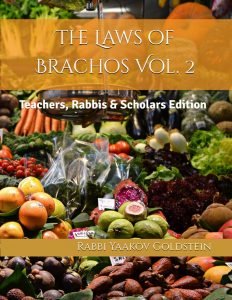*As an Amazon Associate I earn from qualifying purchases.
. General rules of Shehakol:
- Said Shehakol instead of correct blessing:[1]
If one recited the blessing of Shehakol on a food of a different blessing of any kind, he fulfills his obligation and is not to repeat the blessing. This applies whether the food is bread which is Hamotzi, or to a Mezonos food, or to a Hagafen beverage, or to a Haeitz fruit, or to a Ha’adama vegetable. In all the above cases the blessing of Shehakol fulfills the obligation of the food and a new blessing is not to be recited.
Lechatchila:[2] The above law is only Bedieved, however initially it is forbidden for one to fulfill his obligation with the blessing of Shehakol and rather one must research and study what blessing is to be said for the corresponding food and if one is not knowledgeable in the laws of blessings then he is required to study the laws with a Rabbi as explained in Chapter 7 Halacha 16.
- Saying Shehakol in a case of doubt:[3]
If even after one’s study and research he is still left in doubt in regards to which blessing is to be recited over the product, either due to a Halachic question or dispute[4], or due to not knowing at all what the food item is [and cannot tell if it is a fruit, or vegetable, or a Shehakol product], then one is to recite the blessing of Shehakol, being that it covers all products. [Alternatively, one is to eat the product within a meal of bread, if it is a food that can be exempt with Hamotzi. This indeed is the better option, as in such a case there’s no doubt at all regarding the blessing.[5]]
______________________________________________[1] Admur Seder 1:4; Luach 1:5; Admur 167:13 [regarding bread]; 202:24; 206:1; Michaber 167:10; 206:1; Mishneh Brachos 40a; Piskeiy Teshuvos 167:21
[2] Admur Seder 1:5; Luach 1:5; Admur 202:24; M”A 202:36; Rabbeinu Yona Brachos 25a; Ketzos Hashulchan 49:3
[3] Seder 1:4-5; Luach 1:5; Admur 202:24; Michaber 204:13; Rama 202:18; M”A 202:36; Tur 202; Rosh 6:6; Rabbeinu Yona Brachos 25a
[4] Such as rice [Seder 1:10] or fruit soup [Seder 7:12] or a fruit which has completely disintegrated [Seder 7:22-24], or soup from vegetables that have cooked in vinegar [Seder 7:21] or legume porridge that has been slightly cooked [Seder 7:24]
[5] Admur 202:24; Omitted from Seder and Luach ibid, despite Admur bringing this concept regarding rice in Seder 1:11!


 Donate
Donate

Leave A Comment?
You must be logged in to post a comment.